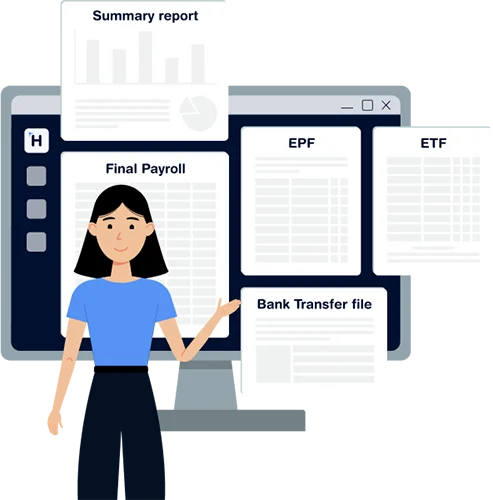In the ever-evolving landscape of taxation, it is crucial to have clear guidelines and regulations to ensure fairness and compliance. The recent release of the explanatory note by the Inland Revenue Department sheds light on a multitude of concerns related to the application of Advance Personal Income Tax (APIT). This article aims to provide a concise, yet comprehensive overview of the key issues and solutions addressed within this explanatory note.
Join us as we unravel the essentials of APIT, demystifying the intricacies that have been clarified through this invaluable explanatory note.
1. Identification of Employment vs. Independent Service Providers (ISP)
a. How to classify
| Employee | Independent Service Providers |
|---|---|
| Derives income from employment | Derives income from business |
| Subject to instructions as to not only what they are to do but how they are to do it | They are told what is required but not how to do it |
| Provided with equipment and materials | Uses their own equipment and materials |
| Employees have no such delegation of power | Can delegate their duties to a third party |
| Remunerated by fixed and ascertainable amounts for the time worked, hence no risk of earning remunerations | Takes risks and derives varying returns and may incur even losses |
| Bound by the entity’s internal rules | Not bound by the entity’s internal rules |
| Employment income is dominant on business income | ISPs income is business income |
b. The case of university lecturers
An explanatory note clarified that most probably,
- Visiting Lecturers of universities are given letters of appointment for a “position of visiting lecturer” under the same employer or a different employer. If a lecturer was given an appointment for postgraduate and other faculty duties under the same employer, then. such visiting lecturer has only one employment contract and all gains and profit from such employment (normal duties and such other duties of postgraduate or other faculties) should be considered to deduct APIT by the same employer.
- If the visiting lecturer’s appointments are given by different employers, then APIT should be deducted based on the primary employment declaration or secondary employment declaration: as the case may be.
- Positions held by university employees during a period of sabbatical leave fall within the meaning of “employment ‘.
- However, earnings derived by a particular subject matter expert in the relevant field by delivering a special lecture (not under the employer) falls within the meaning of a service fee of teaching or lecturing”
c. Resigned/retired but reaccepted employees
Employees who resigned or retired by reentering the organization as reaccepted employees such contracts are recognized as employment
2. Identification of the service of a member or director of a Council. Board, Commission. Authority or Committee or Entity.
a. Who’s classified as “employment”
Anyone who takes part in senior management decisions on behalf of the entity is regarded as employment
b. Primary or secondary employment income?
- Employees can choose whether this is their primary or secondary employment.
- An employee who has only one employment is not required to submit a declaration, it will be considered primary
- If s/he hasn’t furbished a declaration, they will be taxed at the highest rate
3. APIT on Salary arrears
a. How are salary arrears taxed?
Salary arrears are always linked to a previous period with a retrospective effect. A person derives an amount when payment is received by or made available to the person. Therefore, tax laws during the time the payment is received by or made available to the person are applicable regardless of the reason it is paid or the tax laws applicable during the period considered.
b. Defining the term “payment is made available”
The note provides 3 qualifying conditions that determine whether a salary area is considered the main available.
- The legal entitlement to the payment made by a higher authority.
- The payee should have been informed of the payment.
Even if the legal entitlement of the payment is confirmed on a prior date to this date, the date on which the payee is formally informed is considered the date payment is made available
3. The legal assurance that bad debts are not incurred in respect of such payment by the employer.
The note also clarifies that income tax law is applied in a way that is convenient and beneficial to the employee. (e.g.- perhaps arrears are paid to the employee in installments to reduce tax liability) but once decided you cannot change the decision.
4. Quantification of the value of the benefit for traveling, transport, or related facilities
The explanation offered at this point remains vague. However, it dictates that entities such as Government Corporations, Statutory Boards, Government Owned Companies, Commissions, Universities, and institutes established by particular Acts, etc. cannot quantify the value of the benefit included in the traveling, transport, or related facilities provided by the employer as per the item 3(b) and 3(c) of Commissioner General’s circular Number SEC/2023/E/02 dated 06.04.2023.
The text explores various aspects of APIT, including the distinction between employment and Independent Service Providers (ISP) and the complexities of APIT deductions for university lecturers and reaccepted employees. It also discusses the taxation of salary arrears, emphasizing adherence to tax laws by both employers and employees.
However, it’s important to note that some areas, such as quantifying benefits related to traveling and transport facilities, remain challenging, especially for entities subject to government regulations.
For more information and guidance, you can refer to the complete explanatory note provided by the Inland Revenue Department in the resources section below. Understanding these details is crucial for complying with income tax regulations and avoiding potential issues as the tax landscape continues to evolve.
Resources
www.ird.gov.lk/en/publications/Circulars_Circulars/SEC_2023_02.pdf

